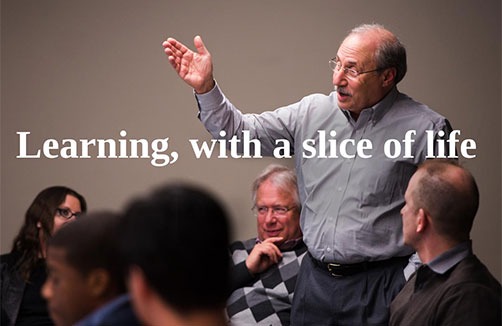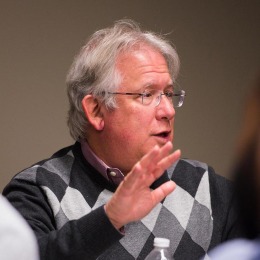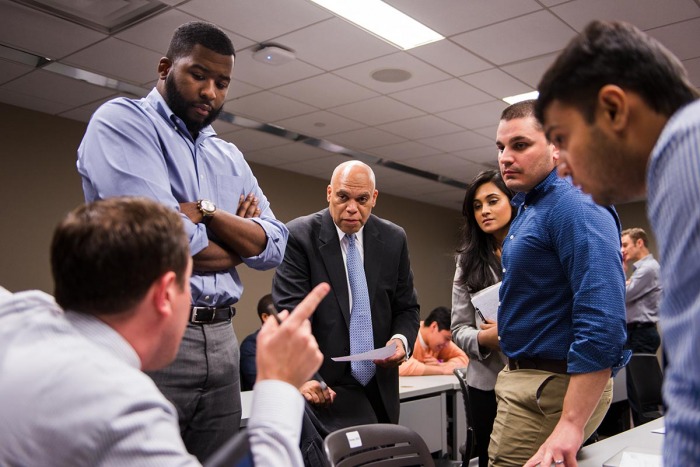
Thoughts (and pizza) from a new Center for Real Estate instructor
I finished my third course where I was an instructor in Real Estate Development as part of Rutgers University’s Graduate School of Management, and specifically part of the Center for Real Estate. By way of background, I have two degrees from Rutgers, including my MBA from the same program in which I now teach. I also have a Master’s Degree in City Planning from Harvard. While there have been many professors in my family, this is my first time joining the ranks.
My teaching partner, Carl Goldberg, and I developed the syllabus from scratch. We are both developers by careers and wanted to teach the issues and techniques that we find useful in the real world. While we have a textbook supporting the course, we rarely refer to it; we require the students to read the book for in-depth background. However, most of the time we use the case study method – and use our own projects as the topic of the respective case. We also have made it a practice of bringing in guest lecturers for almost every session. Our guests are well-known professionals in real estate, and range from bank CEOs to ministers serving the inner city communities, to environmental specialists, to lawyers who discuss the inextricable interplay between politics and real estate. Our goal in bringing in practitioners is to expose the students to real-world decision makers and situations. Further, we want the students upon graduation to have sufficient background and training to make an immediate positive mark on their future employers. We want our students to become seasoned professionals immediately and work towards that end.
So who takes our course? We have had a mix of both undergraduate and graduate students in each of the three years we have been presenting the course. Our classes are dominated by the graduate students who tend to be older, motivated and, in many cases, already working in the real estate industry. Our undergraduates sometimes are there to merely get a grade, but refreshingly, many of them exhibit the same drive and ambition as their older compatriots.
Our students share their backgrounds with us at the start of the course. We have found them to be fascinating. The students come from all over the world, all over the country, and of course, most dwell in New Jersey. The majority of our students are progeny of immigrants – they are the first in their families to go to university. We have mothers and fathers who hold down full-time jobs, take care of their children and still have time and energy to come to class and participate. We also get more traditional students who are following in the footsteps of other family members by going to both undergraduate as well as graduate school. What most of them share is enthusiasm – for their futures, for what they are learning, and how they can apply it to their lives. Carl and I get energized by our students, even though we have been working in the field for 40+ years, which leads to ennui. But when I get approached by a student who has a deal they are looking at and want advice on how to pursue it, I get a charge out of it.
There is a lot of work involved in the course. I mentioned the textbook – some 1,000 pages of text. We also give out additional reading – articles on the business, essays on the role of racism in development, and case studies that apply the tools and concepts that we teach. There are pop quizzes to see if the reading has been done or the concepts discussed in class have been internalized. There are also required field visits– sometimes to a project under construction and other times to a planning board of the student’s choice, with a memo describing what he/she saw.
As professionals in the business, we are generally less concerned about grades than I think purely academic instructors are. Our goal is to convey not only information but also ways to understand the industry. We are easy graders – if the student shows understanding, participates in the class discussion and completes the assignments, then that student is likely to get a good grade. By the same token, if the student does not expend the required effort, grades will reflect that.
We have tuned up the course over time. Our guest lecturers are evaluated on the dynamism they bring to class – the ones who excite the students are asked back. Also, we have been increasing our emphasis on quantitative proficiency. If a student cannot prepare a pro forma, they are unlikely to succeed in the business world.
We review mortgages and notes, loan applications, leases, environmental reports, all of which we want the students to become familiar with. We build on the economic analysis that is taught in the prerequisite, Real Estate Finance. But the highlight of the course is the final two weeks. We take a redevelopment deal as the topic, and assign the class into 4 groups: the developer, the objectors, the municipal professionals and the mayor and planning board. In the penultimate class, the developer presents the project seeking its approval. The objectors try to make the case as why this is bad for the community. In the final class, the municipal professionals analyze the application package and make recommendations to the decision makers. And then the mayor and planning board decide whether or not to approve the project for development. Every student participates and speaks in public; in many cases this is an entirely new experience – but one required of every developer.
There is a huge advantage to becoming part of the Center for Real Estate. Our guest lecturers are mostly part of our Advisory Board. We try to help our students get full-time career jobs. We mentor them as well. When I got my MBA from Rutgers in 1983, I went at night and either didn’t eat at all or grabbed a sandwich at a local deli. Our students work hard and then come to class after the work day has ended, which is also difficult. As a result, we instituted a practice of having pizza delivered in time for the mid-session break. This is paid for not by the University or the instructor, but rather by the Center for Real Estate.
The Center also sponsors symposia, conferences, career panels, distinguished speakers and all of our students are encouraged to attend. Not only are they exposed to current topics and senior executives, but they are also encouraged to seek out job opportunities from our Advisory Board and Leaders Council, many of whom attend these events.
My final thoughts? I am delighted with the quality and ambition of our students. They belie the notion that Millennials are lazy. Some of the responsibilities that are required of some of our students are awe-inspiring. I go home after every class, encouraged by what I see in the next generation and am glad to be part of it.
Learn more about Rutgers Center for Real Estate’s innovative curriculum for undergraduate and graduate studies here.


